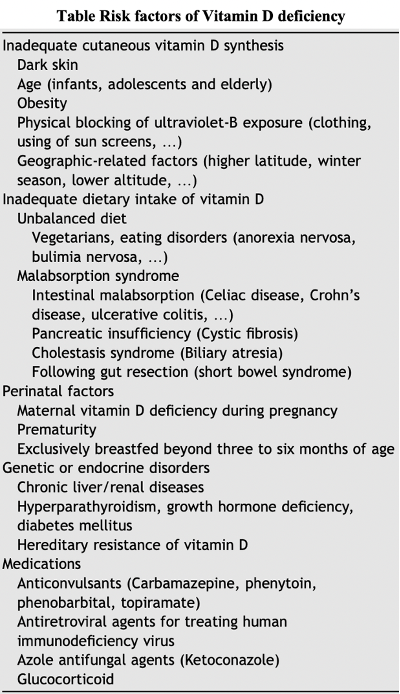Vitamin D is an important nutrient that helps all of the body’s major systems. Severe vitamin D deficiency may lead to rickets in infants or children and osteomalacia in adults, and subclinical vitamin D deficiency is more prevalent and is associated with osteoporosis and a higher incidence of falls or fractures. It was reported that 96% of children with rickets were breastfed, since breast milk contains inadequate vitamin D. In the United States, the American Academy of Pediatrics recommended in 2008 that infants who are exclusively or partially breastfed need 400 international units of vitamin D per day from the first few days of life.
In addition, because vitamin D receptors are present all over the body, vitamin D deficiency conditions may cause a number of effects beyond the skeleton, such as immune dysfunction and pregnancy-related complications. There is also research evidence that a large proportion of migraineurs appear to be likely to suffer from vitamin D deficiency or insufficiency. In addition to routine drug therapy, taking vitamin D may reduce the frequency of attacks in migraineurs.
Often, vitamin D can be obtained through sun exposure or limited natural dietary sources. The American Academy of Dermatology declared ultraviolet radiation to be a known skin carcinogen, so obtaining vitamin D through sun exposure or other artificial sources may not be safe or effective. Therefore, many physicians recommend proper vitamin D supplementation to achieve optimal plasma concentrations for health benefits.

Chang, S. W., & Lee, H. C. (2019). Vitamin D and health-The missing vitamin in humans. Pediatrics & Neonatology, 60(3), 237-244. [Link]
Ghorbani, Z., Togha, M., Rafiee, P., Ahmadi, Z. S., Rasekh Magham, R., Haghighi, S., … & Mahmoudi, M. (2019). Vitamin D in migraine headache: a comprehensive review on literature. Neurological Sciences, 40, 2459-2477. [Link]
